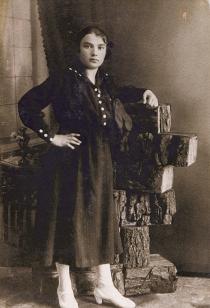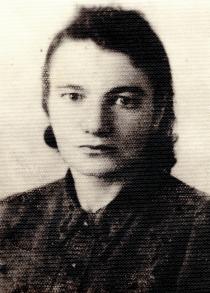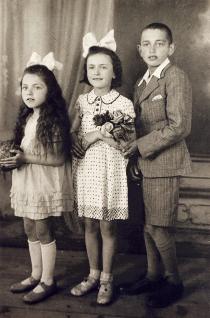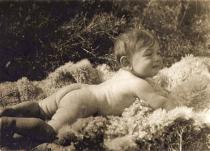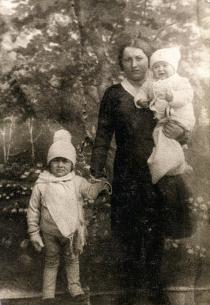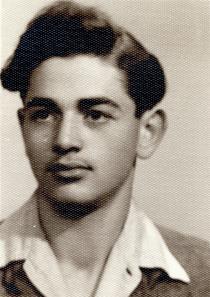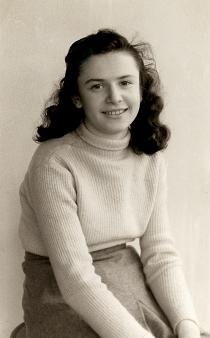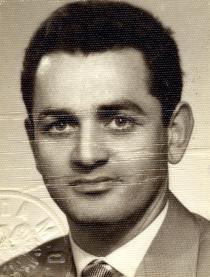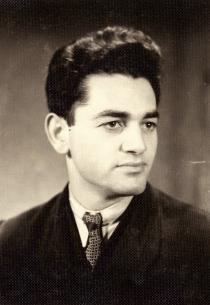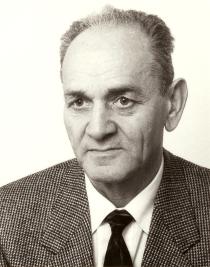This is me, my sister, Priwa, who is one year younger than me, and Lusia, who was three years younger. This picture, which was taken in 1938 or 1939, was given to me by the photographer, who had his photographic studio in Nowe Brzesko before the war. His atelier was in a building that belonged to my grandmother, Genendl Elbinger. When we went back to Nowe Brzesko after the war, he gave me some pictures of our family that he had kept though the war.
As a child I wasn't so very well-behaved. I remember I got a hiding from Father once. My sister had this doll that cried, moved its eyes, said 'Mama,' and I was intrigued as to how it could do that. And one night I cut it open to see what was making the crying. And the sawdust came out, I got to the mechanics, and then I got a hiding. And besides that, I know I didn't have enough calcium, because I used to dig bits of lime out of the wall and eat them, and I used to get a hiding for that too.
With my friends I mostly chased around and fought, that's how it was - boys will be boys. There were Jewish children, Polish children, and we used to go down to the common together. There were worse ones than me, but… we often used to fight, at the drop of a hat. I remember once one of them pushed me, I had a pocket knife in my hand, and it cut me by my eye. It didn't damage my eye, but I had to go to the doctor to have it dressed. I remember that down on the common the boys would pull birds out of nests, kill the baby ones. Drown cats and dogs - that's the way it is in the country. What to do when there's so many puppies and nobody wants them? I didn't like it, but I watched them doing it. I didn't take part, because it turned my stomach to kill a live creature. But there was a kind of cruelty in those boys...
My sister Pola was born in 1932, and Lusia in 1934. We spoke Polish at home. My parents knew Yiddish, and sometimes spoke it to each other. Mother spoke Polish perfectly; Father sometimes dropped Yiddishisms in, because he'd spoken more Yiddish at home.
You went to cheyder [correct form: cheder] from when you were six [Editor's note: boys usually went to cheder from the age of 3]. There wasn't a Jewish school in Nowe Brzesko, but there was a [ritual] butcher and he was our melamed. It was his cheyder. You paid to go. I don't remember what he was called. He'd given over one of his private rooms in his apartment to it. The butcher had a beard, I remember, and he was quite sturdy, not a young man. He wore an overcoat. And I learnt the Bible [Old Testament] with him, and at the same time I learnt Hebrew and Jewish. Some of the boys already knew Jewish, but I didn't. The Bible is in Hebrew, but at the lessons it was translated word by word into Jewish, not into Polish. I remember to this day what I learnt, those bits from the Bible. It was the 5 Books of Moses, the Mish [correct form: Mishnah; the compendium of oral law edited by Rabbi Judah haNasi in approx. 200 A.D.], it's called. And I even studied the Gemara [the compendium of commentaries and explanations supplementary to the Mishnah; together they make up the Talmud]. I went there for two years.

